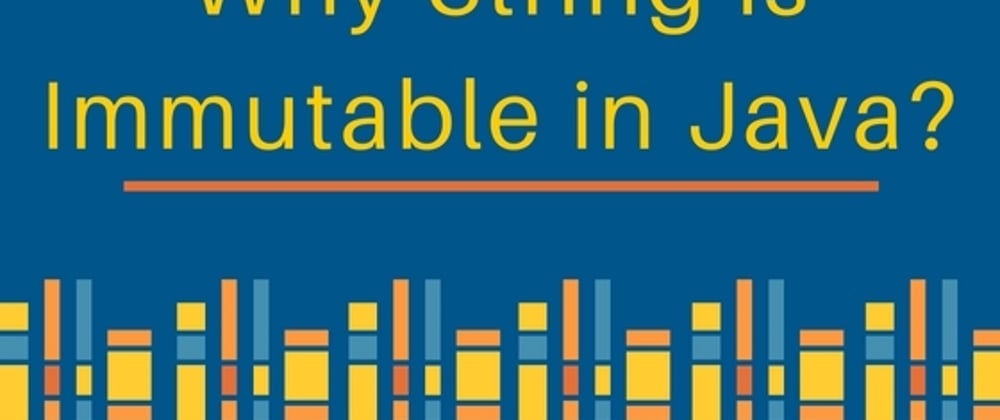Why Are Strings Immutable in Java? Comprehensive Overview for Beginners
Wiki Article
What Is Immutable Strings and Just How It Functions
In the realm of programming, recognizing the idea of immutable strings is extremely important for developing robust and protected applications. Unalterable strings refer to strings that can not be altered after they are created, making sure data honesty and predictability within the code.The Basics of Unalterable Strings
Unalterable strings, as a basic idea in programming, are personality series that can not be altered once they are created. This means that once a string is assigned a value, that worth can not be altered. In languages like Python and Java, strings are immutable things, bring about various implications in terms of memory administration and data stability.One of the crucial benefits of unalterable strings is that they give a complacency in data manipulation. Since the content of an unalterable string can not be customized, it guarantees that the original information stays undamaged, decreasing the risk of unintended changes throughout program implementation (Why are strings immutable in Java?). This building likewise streamlines debugging procedures, as developers can rely on that as soon as a string is specified, its worth will not be inadvertently altered
When a new string is produced based on an existing one, rather than customizing the initial string, the brand-new value is kept separately. Overall, recognizing the fundamentals of immutable strings is crucial for understanding shows concepts and enhancing code efficiency.
Benefits of Unalterable Strings
Structure upon the safety and security and performance benefits of unalterable strings, their benefits reach improving code dependability and simplifying simultaneous programming jobs. By being unalterable, strings can not be customized after development, which eliminates the threat of unexpected adjustments in the information they keep. This intrinsic immutability ensures that once a string is produced, its worth remains constant throughout the program's execution, minimizing the opportunities of pests triggered by unexpected changes.Furthermore, immutable strings add to code integrity by making it simpler to reason about the state of a program. Considering that strings can not be altered, developers can rely on that a string will certainly always hold the same value, streamlining debugging and maintenance initiatives. This predictability brings about more trustworthy and stable codebases.

Implementation in Programs Languages
Within various programs languages, the consolidation of immutable strings is an essential aspect that influences how information is handled and adjusted within code frameworks. The application of immutable strings varies across different programming languages, with each language supplying its very own devices to sustain this idea.

On the other hand, languages like C and C++ do not have built-in assistance for unalterable strings. Programmers in these languages need to manually carry out immutability by implementing guidelines within their code to stop straight adjustments to string items.
Finest Practices for Functioning With Unalterable Strings
When taking care of unalterable strings in programming languages like Java and Python, sticking to ideal practices makes certain safe and secure and effective information control. One of the essential ideal methods is to use StringBuilder or StringBuffer as opposed to directly manipulating strings, specifically when dealing useful reference with comprehensive concatenation procedures. These classes offer mutable choices for string adjustment, helping to avoid unnecessary memory allocations and enhancing performance.Furthermore, when functioning with delicate information such as passwords or API secrets, it is crucial to prevent keeping them as plain text in unalterable strings. Using protected storage systems like char selections or specialized collections for managing sensitive details assists alleviate safety dangers linked with immutable strings.
Real-world Applications and Examples
Exploring sensible implementations of unalterable strings in different industries discloses their significant influence on information stability and system reliability. In the medical care field, unalterable strings play a vital duty in making certain the safety and security and privacy of client data. By preventing unauthorized modifications to delicate information such as clinical documents and prescriptions, immutable strings assist maintain compliance with stringent personal privacy policies like HIPAA.Monetary establishments additionally benefit from the immutable nature of strings to improve the safety of client information and purchase documents. Unalterable strings aid avoid fraud and unauthorized modifications to financial info, supplying a robust defense versus cyber risks and guaranteeing the count on and self-confidence of customers.

Final Thought
In conclusion, unalterable strings are dealt with and stable sequences of characters that offer benefits such as string safety and enhanced efficiency in programming. They are executed in different shows languages to guarantee information stability and safety and security. Ideal practices for functioning with unalterable strings consist of preventing straight modifications and making use of approaches that return new string items. Real-world applications of immutable strings consist of information More Bonuses security, caching, and string control jobs.Unalterable strings refer to strings that can not be altered after they are produced, making sure information honesty and predictability within the code. When a brand-new string is created based on an existing one, instead than modifying the original string, the new value is stored separately.In languages like Java and Python, strings are unalterable by default, suggesting that once a string object is developed, its worth can not be transformed - Why are strings immutable in Java?. Ideal techniques for functioning with unalterable strings include avoiding direct adjustments and utilizing techniques that return brand-new string items. Real-world applications of unalterable strings consist of data encryption, caching, and string control tasks
Report this wiki page